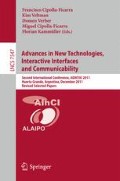Abstract
This paper presents the results obtained by the International Institute Galileo Galilei a research unit of Fundaringenio, within the framework of the research project An interactive information system for e-culture. It aims at designing a web interactive information system for e –culture in order to promote and spread worldwide the cultural heritage of a northwestern region of Argentina for future generations. The research hypothesis is based on a new design of Simbionomic System. Culture as a complex phenomenon, is studied from the Systemic Paradigm. The methodic process consists of the systemic modelling process and the retroprospective methodology. The Method/technique of Syntegration by recursion allows the generation of distinctive cultural features. The selection and application of this interactive processing technique foster integration, cohesion and synergy of multiple topics and perspectives of cultural contents. The process, that is being tested- allows the different aspects of a central problem to be examined in parallel.
Access this chapter
Tax calculation will be finalised at checkout
Purchases are for personal use only
Preview
Unable to display preview. Download preview PDF.
References
Herrera, S.I., Clusella, M.M., Mitre, M.G., Santillán, M.A., García, C.M.: An Interactive Information System for e − Culture. In: Cipolla Ficarra, F.V., de Castro Lozano, C., Pérez Jiménez, M., Nicol, E., Kratky, A., Cipolla-Ficarra, M. (eds.) ADNTIIC 2010. LNCS, vol. 6616, pp. 30–43. Springer, Heidelberg (2011)
Clusella, M., Luna, P., Ortiz, E.: Systemic Epistemology: A synthetic view of the Systems Science Foundations. In: First World Congress of IFSR. IFSR Press, Kobe (2005)
Rosnay, J.: El Hombre Simbiótico: Miradas sobre el tercer milenio. Ediciones Cátedra, Madrid (1996) (in Spanish)
Luna, P.A.: Cursos Sistémica y Metódica. Cátedra FCEyT, UNSE, Santiago del Estero (2002) (in Spanish)
Schwaninger, M.: A cybernetic model to enhace organizational intelligence. In: Systems Analysis Model Simul., vol. 43(1), pp. 53–65. Taylor & Francis, London (2003)
Bunge, M.: Social Systems: Foundations & Pholosphy of Sciences. Mc Graw Gill University, Montreal (1997)
Francois, Ch.: International Encyclopedia of Systems and Cybernetics. Munchen (2004)
Clusella, M.: La sistémica, como ciencia de sistema, requiere asumir una postura ética para servir mejor a las culturas, sus comunidades y personas. ALAS 2, Ibagué (2007) (in Spanish)
Clusella, M.: Organizational changes in catching-up countries context. In: 19th European Meeting of Cybernetics Systems. IFSR Press, Vienna (2008)
Ortiz, E., Clusella, M.: Civilization-Culture Context as Sistemic Background. In: Proc. 50th Annual Meeting ISSS. ISSS Press, California (2006)
Santillán, M.A.: Tesis sobre aproximación sistémica a los Mitos y Leyendas Santiagueñas. Coloquios Universitarios, Termas Río Hondo (2006) (in Spanish)
Colombres, A.: Teoría transcultural del Arte. Ed. del Sol, Buenos Aires (2003) (in Spanish)
Austín, M.T.: Hacia una visión sistémica de la sociedad y de la cultura. Ed. del Sol, Buenos Aires (2000) (in Spanish)
Isajiw, W.: Entender la diversidad. Thompson Pub., Toronto (1999) (in Spanish)
Maier, A.: Complete Beginner’s Guide to Interaction Design, http://www.uxbooth.com/blog/complete-beginners-guide-to-interaction-design
Ronchi, A.: eCulture: Cultural Content in the Digital Age, 91 p. Springer, Heidelberg (2009)
Interaction Design Asociation. IxDA, http://www.ixda.org
Colorado, A.: Perspectivas de la cultura digital. Universidad Complutense, Madrid 15(28), 103–115 (2010) (in Spanish), http://www.ehu.es/zer/zer28/zer28-06.pdf
Norman, D.: Emotional Design. Perseus Books, New York (2004)
Schwaninger, M.: The evolution of organizational cybernetics. In: Proc.: Scientae Mathematicae Japonicae online, e-2006 (2006)
Schwaninger, M.: What can cybernetics contribute to the conscious Evolution of organizations and society? In: System Research and Behavioral Science, Syst. Res., vol. 21, pp. 515–527. John Wiley & Sons, New York (2004)
Schwaninger, M.: Optimal Structures for Social systems. In: Proc. Complexity Theory and Philosophy Workshop, Rio de Janeiro (2004)
Flood, R., Jackson, M.: Creative Problem Solving. Total Systems Intervention. John Wiley, London (1991)
IFSR. The Official Journal of International Federation System Research. Marzo-Abril, Mayo-Junio- Julio-Agosto, Septiembre-Octubre (2011)
Andriessen, D.: Metaphors in Knowledge Management. The Official Journal of the International Federation for Systems Research 28(2) (2011)
Rosnay, J.: El Macroscopio. AC, Madrid (2011)
Walton, D.: Fundamentals of Critical Argumentation. Cambridge University Press, Cambridge (2006)
Besnard, P., Hunter, A.: Argumentation in Artificial Intelligence. In: Rahwan, Simari (eds.) Argumentation Based on Classical Logical. Springer, Berlin (2009)
Marina, J.: Conferencias sobre inteligencia audiovisual. Colegio Monserrat, Madrid (2009) (in Spanish), http://www.think1.tv
Luna, P.D., Palavecino, M.L., Leguizamón, H.: Enmarque en inteligencia audiovisual por sistemas infonómicos “e-culture”. In: XV Jornadas Nacionales de Investigadores en Comunicación, Río Cuarto (2011) (in Spanish)
Herrera, S., Zuain, S., Gallo, F., Avila, H.: Emotion and Communicability in e-culture Applications. In: Proc. HCITOCH 2011, Huerta Grande, Córdoba. Springer, Heidelberg (2011) (in printer)
Pérez Gonzáles, R., Massoni, S.: Hacia una nueva Teoría General de la estrategia. El cambio de paradigma en el comportamiento humano, la sociedad y las instituciones. Editorial Ariel, Madrid (2009) (in Spanish)
Author information
Authors and Affiliations
Editor information
Editors and Affiliations
Rights and permissions
Copyright information
© 2012 Springer-Verlag Berlin Heidelberg
About this paper
Cite this paper
Clusella, M.M., Mitre, M.G., Santillán, M.A., Generoso, A., Budàn, P.D. (2012). Integrated Synergy for Cultural Contents Recursivity in e-Culture System. In: Cipolla-Ficarra, F., Veltman, K., Verber, D., Cipolla-Ficarra, M., Kammüller, F. (eds) Advances in New Technologies, Interactive Interfaces and Communicability. ADNTIIC 2011. Lecture Notes in Computer Science, vol 7547. Springer, Berlin, Heidelberg. https://doi.org/10.1007/978-3-642-34010-9_2
Download citation
DOI: https://doi.org/10.1007/978-3-642-34010-9_2
Publisher Name: Springer, Berlin, Heidelberg
Print ISBN: 978-3-642-34009-3
Online ISBN: 978-3-642-34010-9
eBook Packages: Computer ScienceComputer Science (R0)

